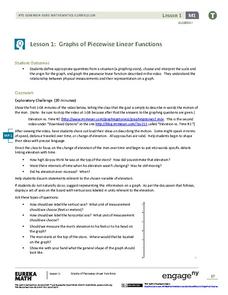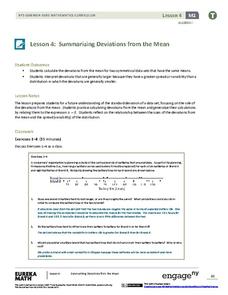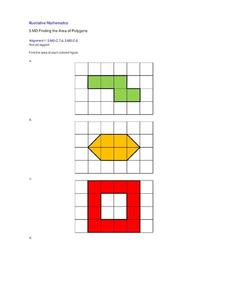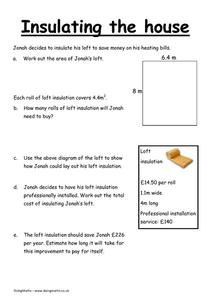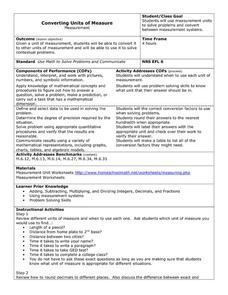EngageNY
Recursive Challenge Problem—The Double and Add 5 Game
Math is all fun and games! Use a game strategy to introduce the concept of sequences and their recursive formulas. The activity emphasizes notation and vocabulary.
EngageNY
Solving Problems in Two Ways—Rates and Algebra
Build confidence by using multiple approaches to problem solving! This resource uses a visual and algebraic approach to solving application problems. A discussion is included about efficient approaches to different problems.
EngageNY
Applications of Systems of Equations and Inequalities
Is the application of systems of equations giving your class headaches? Use this resource to build on your pupils' logic to lead them to building equations and using algebraic methods. The lesson begins with an exploration of solving...
EngageNY
Solving Equations
Teach solving equations through an exploration of properties. Before pupils solve equations they manipulate them to produce equivalent equations. The activity switches the focus from finding a solution to applying properties correctly.
EngageNY
Solution Sets for Equations and Inequalities
How many ways can you represent solutions to an equation? Guide your class through the process of solving equations and representing solutions. Solutions are described in words, as a solution set, and graphed on a number line....
EngageNY
Analyzing Graphs—Water Usage During a Typical Day at School
Connect your pupils to the problem by presenting a situation with which they can identify. Individuals analyze a graph of water use at a school by reasoning and making conclusions about the day. The lesson emphasizes units and labels of...
EngageNY
Graphs of Piecewise Linear Functions
Everybody loves video day! Grab your class's attention with this well-designed and engaging resource about graphing. The video introduces a scenario that will be graphed with a piecewise function, then makes a connection to domain...
EngageNY
Two Graphing Stories
Can you graph your story? Keep your classes interested by challenging them to graph a scenario and interpret the meaning of an intersection. Be sure they paty attention to the detail of a graph, including intercepts, slope,...
University of Nottingham
Modeling Conditional Probabilities: 2
Bring the concept of conditional probability alive by allowing your classes to explore different probability scenarios. Many tasks have multiple solutions that encourage students to continue exploring their problems even after a solution...
National Security Agency
Multiple Representations of Limits
After an introductory activity to demonstrate the theory of a limit, additional activities approach a limit from graphical, numerical, and algebraic methods. The activity looks at the multiple ways of understanding and evaluating a limit.
West Contra Costa Unified School District
Matching Quadratic Functions
Ever sigh when learners ask why they have to know so many different forms of the quadratic equation? Here is a lesson plan that comes in handy! Using hands-on matching activities, quadratic equations are explored through their graphical...
EngageNY
Summarizing Deviations from the Mean
Through a series of problems, learners determine the variability of a data set by looking at the deviations from the mean. Estimating means of larger data sets presented in histograms and providing a way to calculate an estimate round...
EngageNY
Summarizing Bivariate Categorical Data
How do you summarize data that cannot be averaged? Using an exploratory method, learners complete a two-way frequency table on super powers. The subject matter builds upon 8th grade knowledge of two-way tables.
EngageNY
Interpreting the Standard Deviation
Does standard deviation work for non-symmetrical distributions, and what does it mean? Through the use of examples, high schoolers determine the standard deviation of a variety of distributions and interpret its meaning. Problems require...
EngageNY
Interpreting Correlation
Is 0.56 stronger than -0.78? Interpret the correlation coefficient as the strength and direction of a linear relationship between two variables. An algebra lesson introduces the correlation coefficient by estimating and then calculating it.
EngageNY
Describing the Center of a Distribution
So the mean is not always the best center? By working through this exploratory activity, the class comes to realize that depending upon the shape of a distribution, different centers should be chosen. Learners continue to explore the...
Teacher's Guide
Two-Digit Addition without Regrouping
Youngsters practice adding two, two-digit numbers without regrouping. There are 15 equations to solve.
World Wildlife Fund
Graphs and Charts
A two-part worksheet incorporating bar graphs and pie charts, young mathematicians can practice their graphing skills. Pupils answer questions using graphs and charts but are also challenged to create their own using a given set of data.
Curated OER
Finding the Area of Polygons
Third graders are exposed to finding the area of polygons by decomposing figures and recomposing them into rectangles. This strategy allows children to expand on their prior knowledge of constructing shapes by rearranging parts into...
Doing Maths
Measures of Length 2
Converting lengths is the focus of a metric worksheet that involves mathematicians to calculate a given number by 1000, and then convert a measurement using kilometers into meters. Finally, learners are asked to solve two word problems...
Doing Maths
Measures of Length
A set of ten skill-based problems and two word problems make up a metric activity in which measuring length and converting units of measurement is the focus.
Doing Maths
Insulating the House
Finding the area of a rectangle is the focus of this metric learning exercise. Here, mathematicians use their knowledge of finding the area of a shape in meters to discover how much material can fit inside a shape.
Doing Maths
Converting Metric Measurements Code-Breaker
Can your scholars crack the code of this metric worksheet? To start, mathematicians must convert different units of measurement to the standard metric system form. Then, pupils plug in the corresponding letter to the correct answer to...
Ohio Literacy Resource Center
Converting Units of Measure
Follow six steps to implement this series of metric worksheets. Here, mathematicians exhibit their knowledge of problem solving, while converting units of measurement and label their answers with the applicable unit name.








